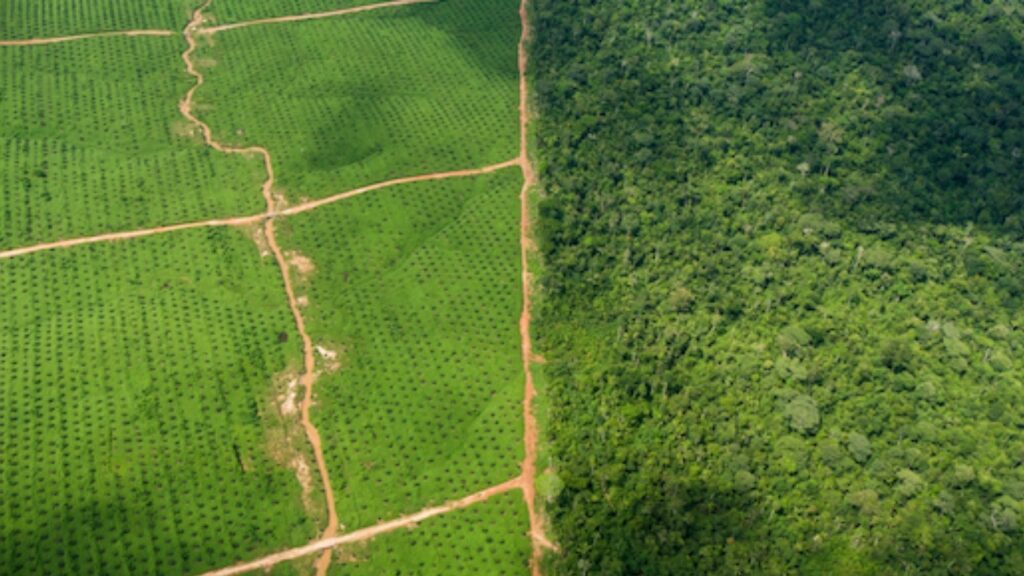Palm Oil Supplier to Kellogg’s, Colgate, Nestle linked to Peru deforestation – EIA Reports

|
Listen to this story:
|
New report exposes illegal Amazon deforestation as Peru approves scandalous ‘amnesty’ law forgiving past forest crimes
A new report by the Environmental Investigation Agency (EIA), Carving Up the Amazon, exposes how palm oil and cocoa companies are driving deforestation in the Peruvian Amazon while committing illegalities with government complicity. Palm oil produced by some of these companies entered the supply chains of major multinational firms like Kelloggs, Nestle and Colgate. The palm oil was also traded to firms headquartered in Belgium (Vandemoortele) and Spain (Lipsa) that produce goods for the European Union (EU) market, just as it brings into force a new law – the European Union Deforestation Regulation (EUDR) – which prohibits imports of commodities from any illegal deforestation, as well as those from legal deforestation post-December 2020.
Yet Peru’s Congress recently rushed to approve new legislation that modified the forest law and which legalized much of the unlawful deforestation by some of the companies featured in the report. The new forest law modification also violated the terms of the U.S.-Peru Trade Agreement, which obliges both countries not to weaken environmental protections to encourage trade. It was supported by Peruvian trade and export federations that cited the EUDR as a justification for approving it. As a result, tainted palm oil and cocoa produced by firms that operated for years with impunity may continue being traded to unwitting European and Peruvian consumers, setting a dangerous precedent risking more illegal Amazon clearance in the future.
Official information reveals that a massive 2,774,563 hectares of forest have been cleared in Peru over the last two decades; an area roughly the size of Haiti. While the government attributes much of this loss to small-scale agriculture, EIA’s investigation sheds light on the growing threat posed by industrial-scale palm oil and cocoa production in the Peruvian Amazon. According to EIA’s findings, the featured companies, ten in total, committed a range of abuses, including, clearing over 13,000 hectares of Amazon rainforest, acquiring illegally titled land, deforesting without permits, failing to produce the required environmental documentation, not paying fines and violating the rights of Indigenous Peoples and local communities. The report also reveals severe governance failures by the Peruvian state on the firms’ operations and points to cases of government complicity in illegal behavior.
RELATED ARTICLE: Indonesia to Return 200,000 Hectares of Palm Oil Plantations to Forests
The publication of the forest law modification in January 2024 – which legal analysts claim was rushed through by Peru’s Congress, ignoring proper procedures – forgives all historic illegal deforestation committed on rural properties or areas cleared for agriculture, and risks allowing more future deforestation. Consequently, it prevents agribusinesses from being held accountable for any previous unlawful forest clearance, thus circumventing critical provisions of the EU’s new law. Peruvian civil society organizations, including Indigenous Peoples and NGOs, protested against the law, which is also being challenged in the courts for violating the Constitution.
Julia Urrunaga, EIA’s Peru Director said, “This law undermines the fight against impunity by rewarding bad actors for illegal deforestation and risks encouraging more destruction. It should be repealed and any firms involved in unlawful forest clearance held accountable for those crimes”.
EIA calls for the EU, U.K., U.S., Norway and Germany – all providing aid to conserve tropical forests and some of which expressed concern about how the new law would impact those efforts – to work with the Peruvian government to convince it to repeal the forest law modification, increase transparency in the land sector, hold accountable companies and state officials involved in illegality, comprehensively reform state institutions and promote laws that protect, rather than harm, the Amazon and the people that depend on it.







